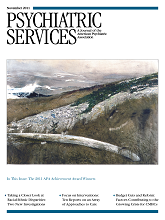Talking to Families About Mental Illness: What Clinicians Need to Know
Charles Nemeroff's topmost blurb on this book's back cover states that this volume “should be required reading for all mental health professionals, especially those in training.” Many who read this excellent offering will probably not only agree with Dr. Nemeroff but may even want to expand his recommendation of this volume to include friends and family of persons with mental illness.
This book is deserving of such high praise because author Igor Galynker, M.D., Ph.D., drew from his lengthy experience working with people with serious mental illness and combined this with his unusual innate talent for engaging family members in conversation. The result is that he has produced an excellent manual for teaching practitioners how to effectively communicate with family members about important issues related to having a loved one with mental illness. Dr. Galynker has over 20 years' professional experience in an acute inpatient psychiatric unit. He has been working as a family therapist at the Family Center for Bipolar Disorder, which he founded several years ago, and he is a professor of clinical psychiatry at the Albert Einstein College of Medicine.
One particularly valuable aspect of this book is the author's use of scores of case vignettes throughout the text. These paragraph-long vignettes provide specifically worded templates for responding to typical questions from family members about the side effects of medicines, poor hygiene, possible dangerousness, and so on. In doing so, he is careful to avoid psychiatric jargon, and his use of plain English is refreshing.
Although the book has several sections on talking to family members about conditions that may include psychosis, such as schizophrenia, bipolar disorder, and major depression, he also includes chapters on generalized anxiety disorder and panic disorder, obsessive-compulsive disorder, and personality disorders.
In keeping with the book's focus on dealing with practical issues, the author also devotes a major section of the book to such real-life issues as stress management and school and work considerations. Galynker also takes on social questions, such as whether persons with mental illness should marry and have children. Particularly noteworthy is how the author stresses the deleterious effects of using illicit drugs, especially cannabis, frequently stressing the association of illicit drug use with the likelihood of developing psychotic disorders.
Despite my strong overall endorsement of this book, I do have some reservations. For example, I was somewhat disappointed by how little attention is given to the value of mental health-oriented family and consumer advocacy groups, such as the National Alliance on Mental Illness and Mental Health America. Also, probably because the author's experience primarily has been in the New York City area, some of his recommendations assume a greater availability of psychiatrists than exists in many parts of the country.



